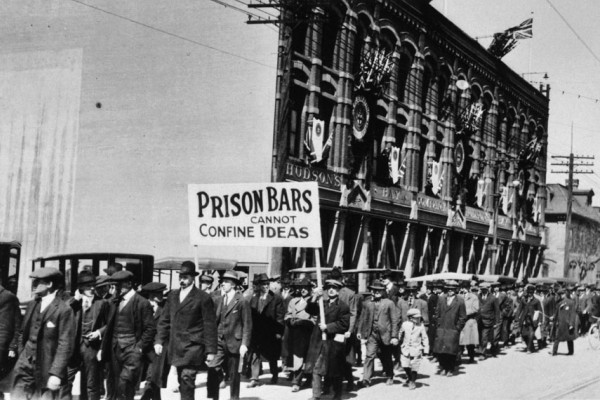-

The spy who kept notes
In 1941, the RCMP recruited Frank Hadesbeck, a Spanish Civil War veteran, as a paid informant to infiltrate the Communist Party. For decades, he informed upon hundreds of people who held progressive views. Hadesbeck’s “Watch Out” lists on behalf of the Security Service included labour activists, medical doctors, and anyone involved in the peace and human rights movements.
-

How Canada’s cultural lobby only serves corporate greed
The cultural lobby’s propaganda prowess in Canada is amply demonstrated by the story Law tells of how we went from all three political parties promising “No Netflix Tax” during the 2015 federal election campaign to the passage of Bill C-11. In a slightly broader sweep of history, the story is about how Ottawa went from foregoing Internet regulation to becoming one of the world leaders in it.
-

What is socialism, anyway?
One thing that should be clear to anyone who has read this book thoughtfully is that socialism cannot be refuted by easy talking points about the Gulag, the “nanny state” or any other such rhetorical excuses for thoughtlessness. To say that socialism is dead is wishful thinking on the part of its enemies.
-

Ed Broadbent: Canada’s most iconic social democrat?
Being on the left will never be easy given the forces we confront, and that pessimism of the intellect must be fused to optimism of the will. Few understood this as well as Canada’s perennial optimist Ed Broadbent, and that is why the new book, Seeking Social Democracy: Seven Decades in the Fight for Equality, is an inspiring read.
-

How ‘Cannibal Capitalism’ is devouring the planet
Few socialists will find much to object to in Cannibal Capitalism, and many will say they’ve been advocating for versions of the ideas put forth in this book for some time, including the notion that “what counts as an anti-capitalist struggle is… much broader than Marxists have traditionally supposed.” But Fraser is not just preaching to the converted.
-
_The_Payment_of_the_Tithes_Bonhams_600_400_90_s_c1.jpeg)
Poverty in Britain: From feudalism to neoliberal capitalism
Based on the latest scholarship in the field, University of Winnipeg professor Jim Silver tells the story of early modern poverty with due attention to questions of child poverty, the condition of women, slavery and colonialism with illuminating examples of upper-class cruelty visited on those without means who were considered responsible for their own fate.
-

Winnipeg, 1919: How understanding the past is a product of the present
The essays comprising For a Better World contain a contradictory interpretive dynamic, in which a present-minded insistence that the Winnipeg General Strike unfolded within a white working class erasure of Indigenous peoples co-exists with a more traditional analytic accent on the politics of class struggle.
-

Sabotage in the time of the Anthropocene
Scott Stoneman reviews the recently released film adaptation of How to Blow Up a Pipeline and lays bare the through lines between the movie and its source material that is garnering attention for its endorsement of industrial sabotage. As Stoneman writes, the film’s conclusion does not present a clear-cut victory; it is more like a morally-ambiguous hedging.
-

Making sense of the senseless war in Ukraine
War in Ukraine has been referred to as a “primer” on the Russia-Ukraine war, and that is the right description for it. Yes, “primer” has connotations of something a bit too basic and boring, but this book is not boring; it is concise, to the point, and the historical material it covers casts serious doubts on the mainstream interpretation of events.
-

The Indigenous fight to stop uranium mining in Canada’s North
These struggles in the remote corners of our country are consequential and often we in the south hear very little about what actually happened, when we hear anything at all. Thanks to this book the story of the so far successful battle against uranium mining in the Kivalliq region of Nunavut has a compelling container.



